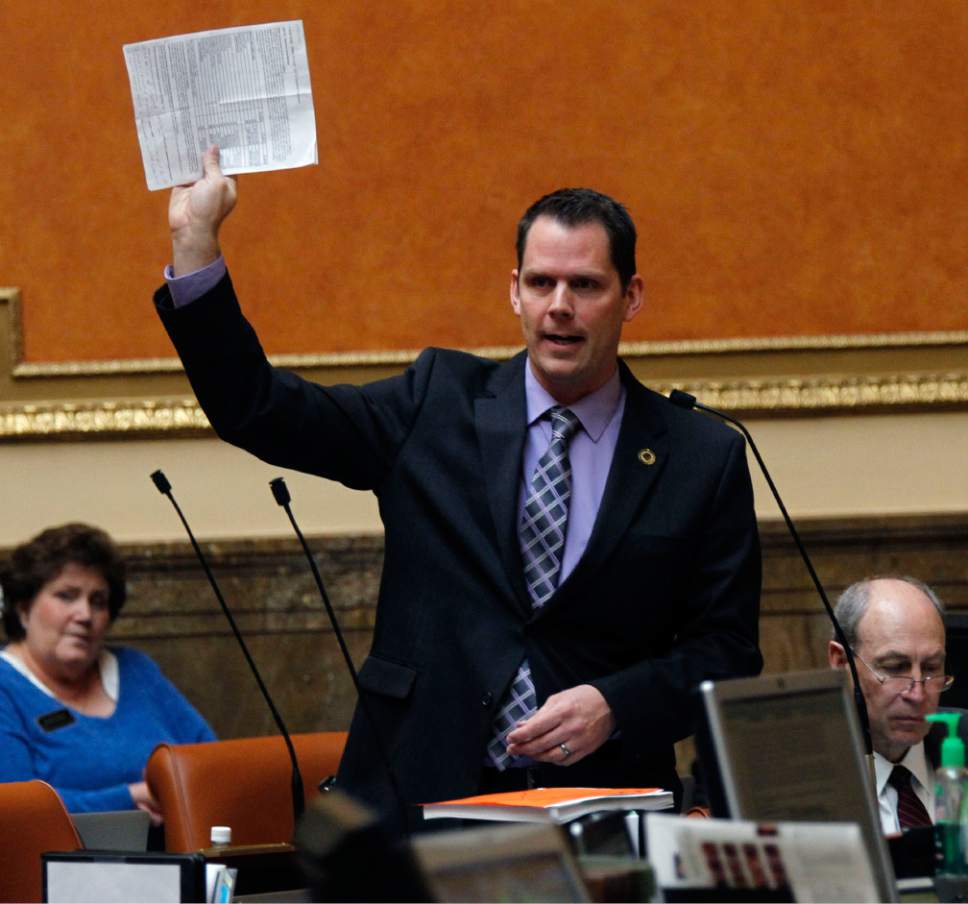This is an archived article that was published on sltrib.com in 2017, and information in the article may be outdated. It is provided only for personal research purposes and may not be reprinted.
The Utah County Republican Party — often at odds with some GOP legislators about whether they are loyal enough to conservative values — was considering banning them from serving on the party's state central committee.
So the legislators fought back with a united front and 18 of them, almost all of those in the county, filed to run for those central committee posts at Saturday's GOP county convention. The state central committee governs party operations and oversees its finances.
"If they are going to throw one of us out, then they ought to throw all of us out" of the central committee, said Sen. Curt Bramble, R-Provo.
Faced with such opposition, County Republican Chairman Craig Frank said a steering committee removed the questionable rule for now. So many of the legislators have since withdrawn from these races.
It began when Sen. Jake Anderegg, R-Lehi, decided to run for the state central committee this year.
Anderegg said he was told bylaws require elected officials to resign from party positions once they are elected to partisan office, so officials were questioning whether that allows legislators to serve on the committee.
That's ironic, Anderegg said, because the party's constitution — which supersedes bylaws — automatically puts all elected GOP officials on the county central committee, so he questions why they would be banned from serving on a similar committee at the state level.
Anderegg said he believes, and it has been the practice for years, that the bylaw was meant to prevent elected officials from serving in party offices, such as county chairman or chairwoman, vice chairman or vice chairwoman, secretary and treasurer, or as chairman or chairwoman of legislative districts and precincts.
Anderegg's argument? "If the delegates don't want me, I won't be elected. But why are you taking the power away from the delegates to determine whom they want?"
He said he then called other legislators in the county to tell them what was happening, and ask them to run to bring attention to what was happening.
"Everyone of them said, 'Jake, I'm willing to help you out,' " but also indicated they may later withdraw from races, Anderegg said. "I think the interpretation from the steering committee is dead wrong."
Frank, a former legislator, said the bylaw — which had been in place for years — was withdrawn last week and referred for more consideration later. The county party's executive and central committees could reinstate it before the Saturday convention, but he doubts that will happen.
Party leaders were not trying to remove legislators from the state committee, Craig said, but were trying to clarify the meaning of the longtime bylaw. "Maybe no one read it before," he said.
"There's no rift there," he said of the relationship between legislators and party leaders.
But Rep. Mike McKell, R-Spanish Fork, said, "It's fair to say there's been a tenuous relationship between Craig Frank and many of Utah County legislative caucus."
He adds, "Utah County legislators want to help look for solutions and want to help fix the party and the state central committee" and financial debt it faces. "It's ironic that some would rather have us blocked, and I think that's really unfortunate."
Bramble said the latest instance of county GOP leaders reinterpreting bylaws "and other actions that have been done on a regular basis" give pause to "delegates and everyday Republicans. This is one in a long list of those kind of things."
Among controversies was the party refusing to give candidates lists of delegates if they failed to file "candidate fitness" questionnaires, which included asking whether they would ever vote for anyone but a Republican in a presidential race (some refused to vote for Donald Trump).
The party also decided to work against some GOP candidates in primaries because they had skipped the party's preferred caucus-convention system and qualified for the ballot instead by gathering signatures.





